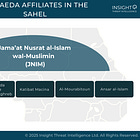JNIM (Al-Qaeda affiliate Jama’at Nusrat al-Islam wal-Muslimin) has been on the march in Africa, expanding its areas of operations across Burkina Faso, Mali, and Niger, and most recently into Nigeria. The group has encroached on Mali’s capital, Bamako, and created a fuel blockade over the last two months that has seriously threatened the capital.

Last week, news reports surfaced indicating that JNIM received a $50 million ransom from the UAE for several hostages the group had kidnapped. This is not new: JNIM has conducted widespread kidnapping campaigns targeting foreign nationals to finance its operations. However, according to BBC Monitoring, the exchange also involved an additional $20 million of arms and ammunition for the militants,1 and the release of 20 JNIM prisoners from a Bamako jail. (Alternatively, some sources report that JNIM will receive an additional $20 million instead of the arms and ammunition.) As part of the deal, JNIM militants began allowing fuel tankers and trucks to reach the capital. (Other sources, including the excellent Wassim Nasr, report that the blockade remains in place and that this was not part of the negotiation.)
Prior to 2020, groups within the JNIM umbrella were primarily conducting local kidnappings for ransom. These “snatch and grab” kidnappings tend to be shorter in duration and raise smaller sums of money, while international kidnappings for ransom tend to generate far greater ransoms. (I analyze this distinction in my book Illicit Money: Financing Terrorism in the 21st Century). In 2020, JNIM secured around $40 million in ransom for one French and two Italian hostages, so these sums of money are not unprecedented for the group.
Here at Insight Monitor, we ~very~ roughly estimate that JNIM generates about $100 million per year in revenues. (Estimating terrorist revenues is extremely difficult, particularly as it tends to rely on estimates of informal economic activity, taxation, extortion, territory controlled, and a host of other sources of funds. You can read our full analysis below.)
They use this money to pay for fighters, food, sustenance, and sometimes weapons (although many of their weapons have been stolen from the various militaries they confront), as well as to provide governance, security, and justice in their areas of territorial control. This money also helps to accelerate their operational reach and sophistication by allowing them to purchase and use improvised explosive devices and drones to conduct assaults.
Our terrorist financing analysis course caters to researchers, intelligence, law enforcement, and compliance professionals to help them learn about terrorist financing and analyze suspicious patterns and activities more effectively. Sign up today!
This ransom is not pure profit for JNIM: there will be fees to be paid to those involved in hostage care, negotiations, security, etc., but this will still be a lot of money for the group. It’s important to note that ransom payments do not always lead directly to more terrorist attacks. However, in this case, research suggests that there will be at least a short-term increase in the number or intensity of attacks. Further, given the state of the militant advance on the capital, this influx of funds could provide a significant cash reserve for the group as they combat Malian forces. Regardless, kidnapping for ransom has been, and will remain, a core part of the group’s business model. Targeting mining operations and foreign nationals will be a focus for the group, because these types of international kidnappings for ransom generate the most profits, particularly with governments (and corporations) that have the financial (and moral) capacity to pay.
While JNIM’s strategic goals regarding the capital (and Mali in general) are contested, this money could well support a full-scale siege of Bamako. And if not a siege, the money will certainly allow JNIM more operational freedom of movement in the coming months, and likely incentivize them to gain more territory and solidify control and influence in the region. This influx of funds is certainly not going to help the security situation in Mali in the short to medium term and will likely enable more operations (and more technologically sophisticated attacks) in the coming months.
If you’ve been thinking about subscribing to Insight Monitor, the time to lock in is now! Our prices will increase (modestly) in 2026.
© 2025 Insight Threat Intelligence Ltd. All Rights Reserved.
This newsletter and its contents are protected by Canadian copyright law. Except as otherwise provided for under Canadian copyright law, this newsletter and its contents may not be copied, published, distributed, downloaded or otherwise stored in a retrieval system, transmitted or converted, in any form or by any means, electronic or otherwise, without the prior written permission of the copyright owner.
Also reported by Wassim Nasr: https://x.com/SimNasr/status/1985384025754910880




